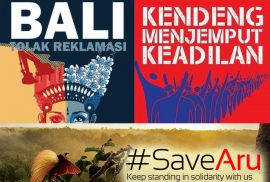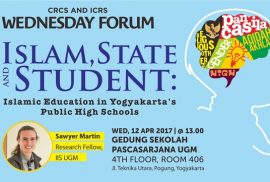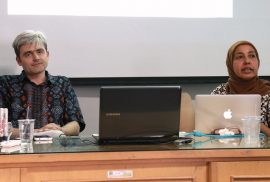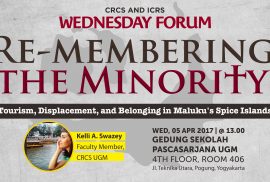Jonathan D Smith | CRCS | Essay

Indonesia is home to many environmental movements, either led by established environmental activists or by groups of indigenous people. The reclamation project in Benoa Bay, cement mining in Kendeng area, Central Java, and the Save Aru movement are just a few recent examples. Does religion play a role in these movements? Are these local movements related to the growing global environmental movement?
The local and global is a crucial element of environmental movements, because environmental problems defy boundaries. Our rapidly-changing climate poses an urgent challenge that is both global and local. As national governments slowly acknowledge their role in reducing carbon emissions (with some exceptions), local communities in Indonesia are living with the problems of rising temperatures and sea levels, increases in natural disasters, and increasing pollution of our air and water.
Local-global connections in religious environmental movements
In 2016 at the climate summit in Morocco, governments met to affirm their adoption of the 2015 Paris Climate Agreement. Signed by 111 countries (as of November 2016), the agreement commits to reducing carbon emissions and recognizes the human impact on climate change. At the same climate summit in Marrakech, hundreds of religious leaders and environmental activists launched the Interfaith Climate Statement.
The Interfaith Climate Statement included these words:
2017

Abstract
One of the most significant ways the Indonesian state plays an active role in the country’s religious life is through education: Muslim students at all levels are required to take Islamic education classes, for which the government writes curricula and employs teachers. Therefore, the state—from the center at the Ministry of Religious Affairs to the periphery at individual teacher at public schools—has considerable power to shape religious perspectives of each new generation. His ongoing research is an ethnographic study of Islamic education in public high schools (Sekolah Menengah Atas Negeri) in the province of Yogyakarta, carried out through classroom observation, teacher interviews, and student focus groups. He will present the characteristics and effects of Islamic education in three fields: (a) perspective of religious diversity within Islam; (b) the valorization of the democratic nation-state as Islamic; and (c) the gender ideologies promoted as normatively Islamic. It is also noted how these phenomena vary in and among schools, noting the influence of socio-economic class, education, gender and religious background.
Speaker
Sawyer Martin French is research fellow at the Institute for International Studies at the Faculty of Social and Political Sciences at Universitas Gadjah Mada. He is currently conducting a yearlong research project on Islamic education in public high schools in Yogyakarta with the support of a grant in socio-cultural anthropology from the National Science Foundation.
Look at the full poster of the event here.
Anang G Alfian | CRCS | Wednesday Forum Report

As a product of the globalized world, social media have created a virtual space of communication and interaction. Many people use it with enthusiasm as it helps humans build communication and connectivity much faster than ever before. On the other hand, many consider this phenomenon a challenge for living ethically and productively.
Dealing with this topic, Wednesday Forum on February 9th 2017 held a discussion on “wefies” (group self-portraits posted on social media) in relation to the Islamic concept of riya’ (showing off piety). The two speakers, Fatimah Husein, currently teaching at CRCS/ICRS as well as UIN Sunan Kalijaga, and Martin Slama of the Institute for Social Anthropology at the Austrian Academy of Sciences, presented the emerging phenomenon of online piety in Indonesia, especially on how Muslims rethink riya’ in today’s popular “wefie” culture. The presentation was based on Husein’s article titled “The Revival of Riya’: Displaying Muslim Piety Online in Indonesia” which has been submitted for a virtual issue of American Ethnologist and Slama’s research project on “Islamic (Inter)Faces of the Internet: Emerging Socialities and Forms of Piety in Indonesia” funded by the Austrian Science Fund.
Laine Berman | CRCS | Voices from America
Sejak tujuh belas tahun lalu, CRCS telah terhubung erat dengan para akademisi Amerika Serikat. Beberapa pelopor studi antaragama dari Amerika, seperti John Raines, Mahmud Ayoub, dan Paul Knitter, telah membantu dalam pendirian dan pengembangan CRCS. Banyak dosen tamu dan para pengajar bahasa Inggris dari Amerika telah mengajar di CRCS. Lebih dari 30 alumni CRCS kini juga telah melanjutkan studinya, untuk tingkat MA atau PhD, di universitas-universitas Amerika. Sehubungan dengan pelbagai kabar politik pascapemilu Amerika, juga fenomena yang serupa di negara-negara lain di Eropa dan Asia, kami mengundang para kolega dan relasi kami dari Amerika untuk menuliskan pandangan atau refleksi personal mereka di situs web CRCS. Artikel berikut ini, yang ditulis Laine Berman, adalah yang kedua untuk seri “Voices from America”. Versi orisinal dari tulisan ini dalam bahasa Inggris dapat dibaca di sini. Seri pertama dapat dibaca di sini.
Laine Berman | CRCS | Voices from America
The United States and Indonesia are both plural societies that struggle to understand how to live together in diversity and with the meaning of pluralism itself. From its beginnings seventeen years ago, CRCS has had strong ties with American academia. Pioneers in inter-religious studies from the U.S., including John Raines, Mahmud Ayoub and Paul Knitter, were present at our founding and have been followed by a number of visiting lecturers who have stayed for a few weeks, months, or years, and by generations of English teachers. In addition, more than thirty CRCS alumni/ae have continued their studies for MA and PhD degrees in American universities. As we followed the news of the U.S. election within the context of the anti-pluralist turns across Asia and Europe, we wanted to know what our American friends are thinking and so we invited them to contribute their reflections to this page. This article, written by Laine Berman, is the second of the Voices from America series. To read the Indonesian translation of this article, click here. To read the first of the series, click here.

Abstract
In post-conflict Maluku, there has been renewed interest in redeveloping the Banda Islands as a major tourist attraction for the region, and as a world heritage site. As practices of tourism represent culture for diverse audiences, they also inform how local inhabitants conceptualize their identities, as well as influence the processes of collective memory. The Indonesian concepts of culture draw on relationships to land, community and cosmology referred to as adat that have a dynamic and complex relationship to people’s religious identifications. In this talk, I’ll explore how Christians displaced from the Banda islands during the conflict are being “re-membered” as outsiders in the process of reconstructing culture for the consumption of tourists, and consider how representations of culture for the tourism industry can potentially strengthen exclusive versions of local identity.
Speaker
Kelli Alicia Swazey is a faculty member at the Center for Religious and Cross-Cultural Studies at the Graduate School of Universitas Gadjah Mada. She holds a PhD in Cultural Anthropology from the University of Hawai’i Manoa. Her research focuses on identity in the public sphere, representation and the media, minority religions in Indonesia, and religion and tourism. She has designed several programs on diversity in Southeast Asia, and has been a featured TED speaker and a fellow of the INK (Innovation and Knowledge) program.
Look at the full poster of the event here.






